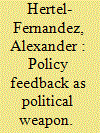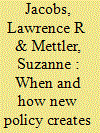|
|
|
Sort Order |
|
|
|
Items / Page
|
|
|
|
|
|
|
| Srl | Item |
| 1 |
ID:
159491


|
|
|
|
|
| Summary/Abstract |
Studies of the “delegated state” highlight the growing role of nongovernmental organizations to fulfill public purposes. We argue that America’s delegated state has taken two distinct forms: a civic-public model prominent in the North and Midwest and a very different religious-private model more evident in the South and the West. Distinctive regional legacies rooted in European immigration, religion, race, and the timing of urban growth gave rise to diverse organizational configurations for assisting the poor in different parts of the country. As a consequence, the institutions for assisting the poor are weaker in the growing regions of the South and Mountain West.
|
|
|
|
|
|
|
|
|
|
|
|
|
|
|
|
| 2 |
ID:
159492


|
|
|
|
|
| Summary/Abstract |
Since 2013, protests opposing police violence against Black people have occurred across a number of American cities under the banner of “Black Lives Matter.” We develop a new dataset of Black Lives Matter protests that took place in 2014–2015 and explore the contexts in which they emerged. We find that Black Lives Matter protests are more likely to occur in localities where more Black people have previously been killed by police. We discuss the implications of our findings in light of the literature on the development of social movements and recent scholarship on the carceral state’s impact on political engagement.
|
|
|
|
|
|
|
|
|
|
|
|
|
|
|
|
| 3 |
ID:
159493


|
|
|
|
|
| Summary/Abstract |
Political scientists often characterize state and local governments as marginal and highly constrained in policymaking. However, I suggest that in recent decades state governments have moved from the margins to the center of partisan battles over the direction of U.S. public policy. Across 16 issue areas, I investigate interstate policy variation, policy differences across states, and policy polarization, the changing relationship between party control of state government and policy outcomes. Since the 1970s, interstate variation has increased such that an individual’s tax burden, right to obtain an abortion, and other relationships to government are increasingly determined by her state of residence. Policy polarization increases dramatically after 2000 in 14 of the 16 areas. I show that party control increasingly predicts socioeconomic outcomes in the polarized area of health care, but not in the nonpolarized area of criminal justice.
|
|
|
|
|
|
|
|
|
|
|
|
|
|
|
|
| 4 |
ID:
159490


|
|
|
|
|
| Summary/Abstract |
Scholars have shown that once in place policies can foster greater political participation. Indeed, politicians often deliberately design policies to shore up political support among their allies. But can political actors engineer the reverse effect, crafting policies that demobilize their rivals? Drawing on the example of conservative cross-state advocacy against public sector unions, I describe the strategy of policy feedback as political weapon, or when actors design policies to politically weaken their opponents. I then document that the passage of conservative network-backed legislation led to large and enduring declines in public sector union density and revenue. I further show that by curbing the power of public unions, the passage of conservative network-backed bills dampened the political participation of public sector employees. My findings emphasize the importance of considering how actors use policy to demobilize political opponents and explain why public unions are now on the defensive in state politics.
|
|
|
|
|
|
|
|
|
|
|
|
|
|
|
|
| 5 |
ID:
159487


|
|
|
|
|
| Summary/Abstract |
In accounting for the endurance of dysfunctional institutions, scholars often highlight the importance of path dependence or incremental change. Yet this fails to capture the creativity that actors deploy to reproduce order, particularly in times of crisis. We propose the concept of dynamic order, rooted in pragmatist theory, as an alternative way to think about institutional durability. Powerful actors reproduce order through creative adjustments to rules and routines that channel action into predictable and controllable behavior. We illustrate this dynamic with examples from the European Union and the United States. In response to the crisis of the Eurozone, EU and state officials invented new procedures that strengthened European governance at the very moment many questioned whether the euro could survive. Likewise, in the United States, public officials responded to social movements and street protests against racism and police brutality by creatively channeling these grievances into judicial proceedings and procedures controlled by the state. By focusing on how elite actors regenerate order in times of crises, our analysis enhances the conceptual toolkit currently available to the scholars of institutions.
|
|
|
|
|
|
|
|
|
|
|
|
|
|
|
|
| 6 |
ID:
159494


|
|
|
|
|
| Summary/Abstract |
Recent political events have prompted an examination of the analytical tools and conceptual frameworks used in political science to understand voting and candidate choice. Scholars in the behavioral tradition have highlighted the empirical relationship between racial resentment and anti-black affect among white voters during and after President Obama’s successful run for re-election. The theoretical role of white identity within the context of the privileged status of this racial group has seen much less scholarly attention by political scientists, particularly with respect to racial group identification and its implications. To address this lacuna, we argue that racial identification among white voters can be conceived of as a utility-based trait relevant to candidate choice, combining a social-psychological approach of group membership together with a rational choice perspective. This conceptualization of the political utility of white racial identity provides wider conceptual latitude for empirical tests and explanations of voting in U.S. elections.
|
|
|
|
|
|
|
|
|
|
|
|
|
|
|
|
| 7 |
ID:
159488


|
|
|
|
|
| Summary/Abstract |
Does political participation make a difference for policy responsiveness, or is affluence what matters most? To examine whether participation beyond voting matters for policy representation, we analyze congruence between citizens’ policy preferences and their representatives’ roll call votes using data from the 2012 Cooperative Congressional Election Study. For the main policy issue for which citizens’ political engagement beyond voting enhances congruence—namely, the Affordable Care Act (ACA) of 2010—we then investigate whether this effect holds when taking citizens’ income into account. The findings show that for the ACA, constituents’ participation beyond voting is associated with increased congruence with their representatives at all levels of income, and that those with less income who are politically active beyond voting experience the largest increase in congruence. However, our findings also show that the potential of political participation and income to enhance congruence is restricted to co-partisans, and to highly partisan and salient issues.
|
|
|
|
|
|
|
|
|
|
|
|
|
|
|
|
| 8 |
ID:
159489


|
|
|
|
|
| Summary/Abstract |
Following E. E. Schattschneider’s observation that “a new policy creates a new politics,” scholars of “policy feedback” have theorized that policies influence subsequent political behavior and public opinion. Recent studies observe, however, that policy feedback does not always occur and the form it takes varies considerably. To explain such variation, we call for policy feedback studies to draw more thoroughly on public opinion research. We theorize that: (1) feedback effects are not ubiquitous and may in some instances be offset by political factors, such as partisanship and trust in government; (2) policy design may generate self-interested or sociotropic motivations, and (3) feedback effects result not only from policy benefits but also from burdens. We test these expectations by drawing on a unique panel study of Americans’ responses to the Affordable Care Act. We find competing policy and political pathways, which produce variations in policy feedback.
|
|
|
|
|
|
|
|
|
|
|
|
|
|
|
|
|
|
|
|
|